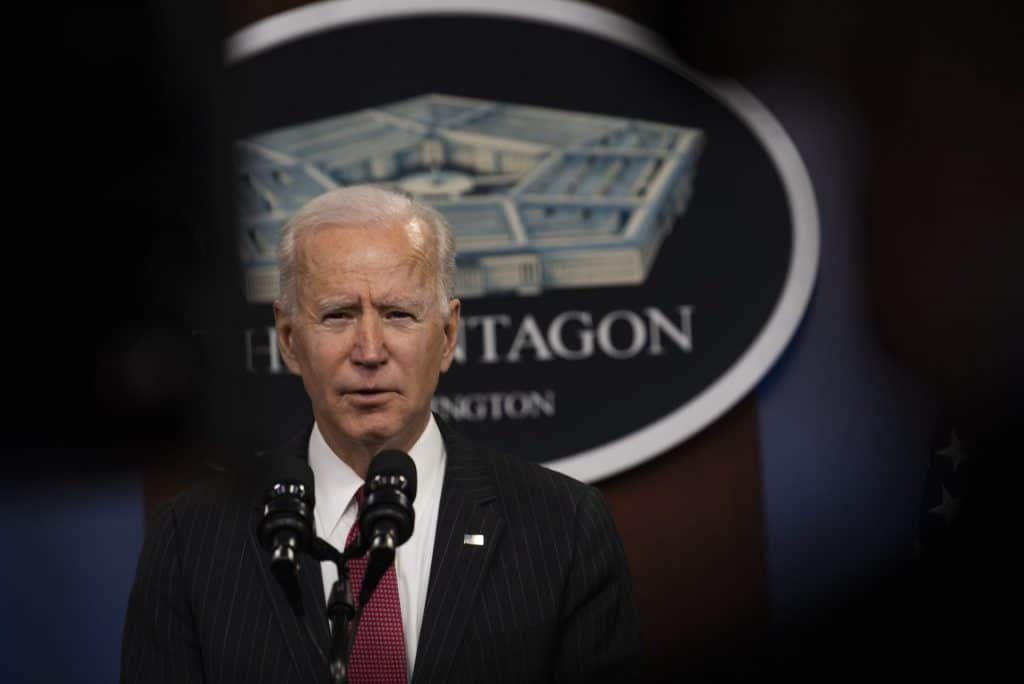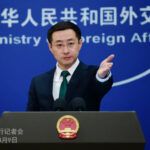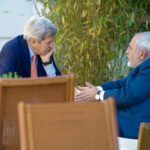Ready, aim, fired: Can Biden rescue the Nuclear Posture Review?
By Stephen I. Schwartz | September 30, 2021
 President Joe Biden delivers remarks to Department of Defense personnel at the Pentagon on February 10, 2021. (DoD/Lisa Ferdinando)
President Joe Biden delivers remarks to Department of Defense personnel at the Pentagon on February 10, 2021. (DoD/Lisa Ferdinando)
Ever since the Clinton administration in 1993, new US presidents have conducted a Nuclear Posture Review (NPR) to assess whether the stockpile size, composition, and operational deployment of US nuclear weapons align with their military policy, foreign policy, and budgetary objectives. The results are used to guide nuclear policies and programs for the remainder of a president’s term.
Although all prior NPRs (there have been four) have generally—and disappointingly—rubber-stamped the nuclear status quo, this one had the potential to be different thanks to President Biden’s deep knowledge of—and longstanding involvement in—nuclear policy matters as a US senator and vice president. Just as important to the possibility of a real review of the US nuclear posture was Leonor Tomero, the highly experienced woman (she served as a senior aide on the House Armed Services Committee for nearly 11 years) Biden nominated to work on those issues and lead the review for the Defense Department as deputy assistant secretary of defense for nuclear and missile defense policy.
The Biden administration’s much-anticipated NPR finally and formally got underway in mid-July. But suddenly, last Thursday, Politico reported that Tomero had been effectively fired when the Defense Department abruptly reorganized her position out of existence and transferred her responsibilities to two other offices—one of which is so new it does not even have a confirmed nominee to lead it. Tomero was further informed she could not take another job in the department, even though multiple open positions at the equivalent seniority level remain unfilled. Although Defense Department spokesman John Kirby offered some unconvincing explanations about the “reorganization” being routine, it wasn’t difficult to discern what had actually happened when an unidentified current Defense official told Politico that Tomero was one of the “arms controllers who used to seem naïve but now seem irrational given what China and Russia are doing.”
Tomero had run afoul of the permanent nuclear bureaucracy (or theocracy, given this cadre’s better-known appellation: the nuclear priesthood), the largely male, largely white, largely conservative group of civilian and military officials who for more than 76 years have designed, built, tested, operated, maintained, and upgraded US nuclear weapons and prepared, programmed, and practiced numerous highly-detailed war plans across a variety of threat scenarios.

It’s telling that being willing to ask serious questions on behalf of the president of the United States about the purpose and costs of US nuclear weapons (of which up to 900 thermonuclear warheads remain on 24/7 alert to enable the president to order their launch at a moment’s notice) and not just accept the dogma of deterrence was sufficient to rile up members of Tomero’s own professional staff, who complained to Republicans on the Senate Armed Services Committee (SASC), who in turn reportedly put pressure on Tomero’s bosses to get rid of her. (That attitude was already on display during a May 12 hearing of the SASC strategic forces subcommittee when Sen. Tom Cotton, Republican of Arkansas, grilled Tomero about whether the United States should adopt a nuclear no-first-use policy or sole-use policy. When Tomero explained her job was to coordinate the review process, consider the risks and benefits of current declaratory policy, assess alternative options, and not impose any personal views she might have, Cotton ended his questioning by complaining he was “now troubled by the direction” of the NPR.) What kind of a “robust” nuclear posture can supposedly deter World War III but not withstand some hard questions about whether all 3,800 nuclear bombs and warheads in the US stockpile (as well as the 400 ICBMs, 280 SLBMs, 66 strategic bombers, and 14 nuclear-powered ballistic missile submarines that carry them) are vital to that mission, to say nothing of affordable?
The writing was on the wall back in early January when Adm. Charles Richard, commander of US Strategic Command, told the Defense Writers Group that the objective of the NPR should be “validation, that we like the strategy that we have. … [T]his nation has had basically the same strategy dating back to the Kennedy administration. It’s been repeatedly validated through multiple administrations. It would be useful to do that again. And then to be satisfied that the capabilities that we have are able to accomplish that.” For Richard, the most senior military officer with operational responsibility over the nuclear arsenal, undertaking any kind of serious, thorough evaluation of nuclear requirements, let alone exploring any potentially beneficial alternatives to a strategy that, in his words, hasn’t changed for 60 years, was wholly unnecessary. But that’s exactly what President Biden wanted when he nominated Leonor Tomero to head up his NPR and to oversee nuclear weapons and missile defense issues more broadly. The question now is whether he will accept an NPR that is likely to do far, far less or find a way to ensure he receives actual policy options to pursue, rather than a nuclear fait accompli that changes little or nothing.
Some of Biden’s former colleagues in Congress expressed alarm this week at Tomero’s removal. Among them was Sen. Ed Markey, Democrat of Massachusetts and co-chair of a congressional working group on nuclear weapons and arms control that earlier this summer called on Biden to “actively guide” the NPR process. On Friday, Markey sent the president another letter with a dozen detailed questions about the Pentagon’s abrupt personnel shake-up and its effect on the NPR, telling Biden that he is “concerned that the sudden departure of a top appointee, charged with presenting you options on the future of the U.S. nuclear weapons enterprise, will result in a draft Nuclear Posture Review that reflects the Cold War era’s overreliance on nuclear weapons, rather than your lifetime of work championing policies that reduce nuclear weapons risks.”
Back to basics. What would an honest and productive NPR look like? Rather than starting with the unquestioned assumption that all the weapons we have and everything we’re already doing to upgrade them is essential and effective, it would go back to first principles to identify the fundamental national security and foreign policy objectives of the United States before proposing a strategy for how nuclear weapons can help to achieve some of them. Next, the review would identify specific military targets to support that strategy, assess the best weapons for those targets, and determine the precise force posture and deployment numbers to hold those targets at risk. Finally, it would quantify the amount of money required to accomplish all of this—including designing, building, testing, and maintaining the warheads and all the supporting infrastructure—both today and well into the future. It would also be managed not just by the Defense Department but jointly with the State Department (to fully assess diplomatic and arms reduction concerns) and the Energy Department (to better include the perspectives of those charged with actually maintaining the nuclear warheads and the facilities that sustain them). And it would allow academics and non-governmental experts (including retired governmental and military officials) opportunities to contribute their knowledge and experience to the process before any drafts are written.
Failing to do that will continue to perpetuate the so-called nuclear triad based on the longstanding but unsubstantiated (and unprovable) belief it is absolutely necessary to our deterrent posture. In fact, the received wisdom of maintaining three distinct strategic delivery systems (four really, given that bombers can drop gravity bombs and launch cruise missiles—but who’s counting?) to enhance our own security and fully thwart state-level adversary threats is a myth. The triad as a concept did not even exist until the 1970s, and from the beginning, it was a post-hoc justification for the results of a massively uncoordinated Cold War arms race—not the one you know about, between the United States and the Soviet Union, but the one between the Air Force, Navy, and Army from the late 1940s well into the 1970s. That arms race was spurred (and maintained) by interservice rivalry, fear, bad intelligence estimates, arbitrary decision-making, fierce competition among defense contractors, and ample pork-barrel politics. In short, the triad is a wholly accidental artifact of decades of decisions that were never fully thought through, not least in terms of how our adversaries would likely react to the tens of thousands of nuclear weapons we mindlessly amassed throughout the Cold War in a futile and increasingly costly effort to guarantee our and our allies’ perpetual security.
A bottom-up approach to the NPR would be far more helpful to the White House and Congress than section 1537 of the yet-to-be-approved Senate version of the 2022 National Defense Authorization Act, which would require Defense, in “consultation with” State, Energy, and the Director of National Intelligence, “to conduct a comprehensive review of the nuclear posture of the United States for the next 5 to 10 years,” with specific emphasis on “current and projected nuclear capabilities of the Russian Federation and the People’s Republic of China, and such other potential threats,” and to submit this so-called “revised” NPR in 2022. Evidently, some senators on the Armed Services Committee were concerned an NPR overseen by Tomero would be insufficiently focused on such matters, or would not fully endorse a suite of new, more advanced US nuclear weapons as a direct response to the nuclear weapons Russia and China appear to be developing.
President George H. W. Bush delivers a national address announcing nuclear weapons reductions, September 27, 1991. (C-SPAN)
To boldly go. It wasn’t always this way. Presidents, and their military advisors, have boldly embraced changes to the nuclear status quo in the past. For example, September 27 marked the 30th anniversary of President George H.W. Bush’s unprecedented decision to order the unilateral elimination of all land-based US nuclear weapons in Europe and South Korea and all US non-strategic naval nuclear weapons, the end of ground alert for all US bombers, and the immediate de-alerting of 450 Minuteman II ICBMs (at the time almost half of our entire ICBM force). Bush acted swiftly following an alarming but failed coup in the Soviet Union and out of a desire to lead the way toward a safer and more secure world by transcending the laborious arms control process. And it worked. Soviet President Mikhail Gorbachev reciprocated eight days later with his own series of unilateral measures, which new Russian President Boris Yeltsin reaffirmed and expanded upon the following January. Thanks to what became known as the Presidential Nuclear Initiatives and the 1991 Strategic Arms Reduction Treaty, by the time Bush left office in January 1993, he had slashed the bloated US nuclear stockpile by nearly 9,500 nuclear warheads (a massive 41 percent reduction).
Today, we’re moving in the opposite direction, spending more than $1.2 trillion over the next several decades to maintain, upgrade, and replace not just every delivery system we currently have but also every operational nuclear bomb and warhead. During US Strategic Command’s recent “Deterrence Symposium,” Sen. Deb Fischer (Republican of Nebraska), the ranking member on the Senate Armed Services Committee’s strategic forces subcommittee, simplistically quoted former Secretary of Defense James Mattis when asked how to balance the considerable cost of nuclear “modernization” against all the other urgent military and civilian needs currently facing the United States: “America can afford survival.” Senator Fischer may believe that every nuclear weapon we built, currently have, or plan to build is essential to our national survival, but there is abundant historical evidence proving just the opposite, and we ignore it at our peril.
President Biden still has the potential to make meaningful, lasting changes to US nuclear policies and weapons programs that can strengthen US and global security and avoid wasteful spending. But to do that, he must do the one thing none of his predecessors were willing to do: play an active, ongoing role in his administration’s own NPR to ensure it presents him with fresh options for the future and not just the same outdated, counterproductive, and hugely expensive justifications from the past.
Together, we make the world safer.
The Bulletin elevates expert voices above the noise. But as an independent nonprofit organization, our operations depend on the support of readers like you. Help us continue to deliver quality journalism that holds leaders accountable. Your support of our work at any level is important. In return, we promise our coverage will be understandable, influential, vigilant, solution-oriented, and fair-minded. Together we can make a difference.















Agree with all you say, but I want to add that President George H.W. Bush is vastly under-appreciated. In addition to the PNI, his masterful handling of the 1991 Gulf War is in stark contrast with any other U.S. military operation since WWII. It also gave the IAEA visibility into Saddam’s clandestine nuclear program, leading to its elimination. Hats off to one of our heroes, including his service as a naval aviator in WWII.